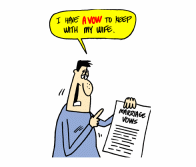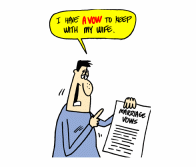The French verb AVOIR means to have.
To remember this imagine: you HAVE A VOW to keep.
AVOIR has many uses, besides meaning 'to have'. It is used to form:
- many common idiomatic expressions, and ...
- MOST compound tenses like 'I have eaten, we had spoken, she has danced ...'
- When learning French, using the compound tenses is an EASIER way to form the PAST TENSES than learning the imperfect tenses. (See below the table for more...)
Take 3 minutes to recite aloud ALL the conjugations of avoir below - by ROW and by (2) COLUMN... then learn the 3 reasons to commit it to memory NOW below the verb table...
|
 |
The MOST IMPORTANT REASON to learn the FRENCH VERB AVOIR
One of the GREAT things about the learning ALL the TENSES of avoir, as you can in this table, is that once you have learned the SIMPLE TENSES (the first part of the table), you will see that four of them are used to make the common COMPOUND TENSES (the second part of the table).
So, learn the SIMPLE tenses in the first part of the verb table, and see them repeated again in the Compound Tenses, in the second part of the table. With the compound tenses you just add the word eu (had) to all of them.
Furthermore those SAME SIMPLE TENSES are used for MOST COMPOUND tenses with MOST VERBS.
Learn them NOW, because you will use them AGAIN and AGAIN and AGAIN and AGAIN.
This is why I strongly encourage you to learn avoir in ALL its tenses NOW because it makes it so much easier to use these verbs in thousands of other verb conjugations!
Learn this table now, and you will EASILY construct the compound tenses for MOST FRENCH verbs. e.g.
- I HAVE eaten (present perfect or passé composé)
- you HAD jumped
- he WILL HAVE thought
- they WOULD HAVE listened
If you did not understand what I just wrote, read and re-read this until you have! It will make your future verb learning MUCH MUCH EASIER.

|
AVOIR is used to ask or say how old someone is: e.g.
Quel âge as-tu? Quel âge avez-vous?
How old are you?
J'ai trente ans
which literally means 'I HAVE thirty years', which would be 'I am thirty years old' in English.
|

|
French speakers 'have cold' or 'have heat' rather than ARE cold/hot etc.
Elle avait froid.
She was cold. (Literally she HAD cold).
Likewise a French person would not say, "I am hungry", but would say, "I have hunger," which is j'ai faim.
Elle a peur.
She is frightened. (She has fear).
|

|
AVOIR is also used to form the compound tenses as you can see in the verb table above.
The compound tenses are an EASIER way to form the PAST TENSES when you are learning French. The reason is that you just need to learn the conjugations of AVOIR and onto this you can tack the past participle.
For example, consider the phrase 'I had eaten.' I had is j'ai (as you can see in the verb table above). Eaten in French is mangé.
So 'I had eaten' is 'j'ai mangé'.
Eaten' and mangé are called past participles.
Notice that mangé sounds just like the infinitive (to eat) which is manger.
The past participle of most ER verbs (which are 80% of French verbs) sounds just like the infinitive, so it is an easy way to form a past tense, especially of ER verbs.
This does not work for IR and RE verbs because their past participles are different sounding to the infinitive. You can see this in the verb table above - where the past participle of avoir is eu.
However, it is a useful tool that works most of the time for ER verbs, and you can use it as you build up your competence with all the verb tenses.
|
|
CONJUGATING the FRENCH VERB AVOIR - The French verb for have avoir is an auxiliary. An auxiliary is used to form other verb tenses e.g. I have been, I had run, we have asked etc
- There are lots more fully conjugated verbs in the French Verbs List.
- Repeating these verb tables of avoir aloud 10 times throughout the day will better embed the patterns into your subconscious, and into your long term memory.
- Reciting aloud is a great way for you to practice your pronunciation, and helps you to memorize all the conjugations of avoir.
|
|
More Verbs like avoir to have ✔
There are many more French Verb Tables like this one.
✔
Check out the other top ten French verbs - the most important ones.
✔ etre
✔ aller
✔ tenir
✔ venir
✔ faire
✔ devoir
✔ pouvoir
✔ vouloir
✔ dire
✔ You can more easily remember words and verbs like the French for have avoir using the techniques of the world's Memory Masters.
|







New! Comments
Have your say about what you just read! Leave us a comment in the box below.